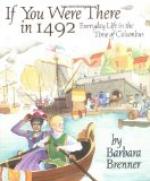Columbus’s desire for discovery.
At what precise period his great idea came into his mind we have no means of ascertaining. The continuous current of Portuguese discoveries had, as we have seen, excited the mind of Europe, and must have greatly influenced Columbus, living in the midst of them. This may be said without in the least detracting from his merits as a discoverer. In real life people do not spring from something baseless to something substantial, as people in sick dreams. A great invention or discovery is often like a daring leap, but it is from land to land, not from nothing to something; and if we look at the subject with this consideration fully before us, we shall probably admit that Columbus had as large a share in the merit of his discovery as most inventors or discoverers can lay claim to. If the idea which has rendered him famous was not in his mind at the outset of his career of investigation, at any rate he had from the first a desire for discovery, or, as he says himself, the wish to know the secrets of this world. It may be a question whether this impulse soon brought him to his utmost height of survey, and that he then only applied to learning to confirm his first views; or whether the impulse merely carried him along with growing perception of the great truth he was to prove, into deep thinking upon cosmographical studies, Portuguese discoveries, the dreams of learned men, the labours of former geographers, the dim prophetic notices of great unknown lands, and vague reports amongst mariners of driftwood seen on the seas. But at any rate we know that he arrived at a fixed conclusion that there was a way by the west to the Indies; that he could discover this way, and so come to Cipango, Cathay, the Grand Khan, and all he had met with in the gorgeous descriptions of Marco Polo and other ancient authorities. We may not pretend to lay down the exact chronological order of the formation of the idea in his mind, in fact, to know more about it than he would probably have been able to tell us himself. And it must not be forgotten that his enterprise, as compared with that of the Portuguese along the coast of Africa, was as an invention compared to an improvement. Each new discovery then was but a step beyond that which had preceded it; Columbus was the first to steer boldly from shore into the waste of waters, an originator, not a mere improver.
Columbus’s theory.
Fernando Columbus divides into three classes the grounds on which his father’s theory was based; namely, reasons from nature, the authority of writers, and the testimony of sailors. He believed the world to be a sphere; he under-estimated its size; he over-estimated the size of the Asiatic continent. The farther that continent extended to the eastward the nearer it came round towards Spain. And this, in a greater or less degree, had been the opinion of the ancient geographers. Both Aristotle and Seneca thought that a ship might sail “in a few days” from Cadiz to India. Strabo, too, believed that it might be possible to navigate on the same parallel of latitude, due west from the coast of Africa or Spain to that of India. The accounts given by Marco Polo and Sir John Maundeville of their explorations towards China confirmed the exaggerated idea of the extent of Eastern Asia.




